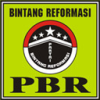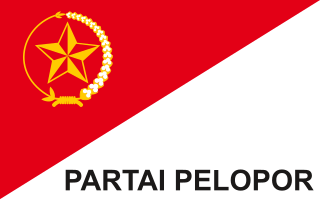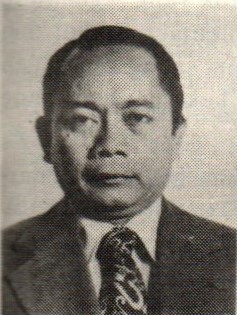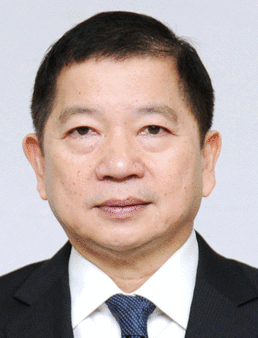
The United Development Party is an Islam-based political party in Indonesia. Due to its distinctive logo, the party is known as the "Kaaba Party".

The Indonesian Democratic Party (PDI) was one of the two state-approved parties during the New Order era of the late 20th-century in Indonesia.

The Reform Star Party was a political party in Indonesia. The party was merged into the Great Indonesia Movement Party in 2011.

The Justice and Unity Party formerly known as Indonesian Justice and Unity Party is a political party in Indonesia.

The Indonesian National Populist Fortress Party was a political party in Indonesia. The founder, Eros Djarot was dissatisfied with the Indonesian Democratic Party – Struggle, which refused to allow him to stand as chairman against Megawati Sukarnoputri at the party conference in 2000. Eros then formed the Bung Karno National Party, named after Indonesia's first president Sukarno. However, as the law did not allow the use of national figures in party names, this was changed to the Freedom Bull National Party.
The Democratic Nationhood Party was a political party in Indonesia. It was established in 2002 as the United Democratic Nationhood Party by a group of intellectuals including Ryaas Rasyid and Andi Mallarangeng, formerly president Susilo Bambang Yudhoyono's spokesman, who were disatissfied with the progress of the reform movement following the Fall of Suharto.

The Indonesian Democratic Vanguard Party was a political party in Indonesia. It was a continuation of the Indonesian Democratic Party (PDI), one of the two state-approved parties during the New Order. After the PDI failed to achieve enough votes in the 1999 legislative elections to qualify for the 2004 elections, it changed its name to the Indonesian Democratic Vanguard Party. In 2004 it won one seat. The party contested the 2009 legislative election, but won only 0.13 percent of the vote, less than the 2.5 percent electoral threshold, thereby losing its only seat in the People's Representative Council. Following its poor result in the 2009 vote, the party joined nine other smaller parties to form the National Unity Party. The party also attempted to contest the 2014 elections, but failed to fulfill the criteria set by the General Elections Commission, and along with nine other parties who also failed to qualify, decided to merge into the People's Conscience Party (Hanura).

The Pioneers' Party was a political party in Indonesia. It was founded in 2002 and was initially led by Rachmawati Sukarnoputri, a daughter of Indonesia's first president, Sukarno, and sister of former Indonesian president Megawati. It contested the 2009 elections, but received only 0.3 percent of the vote, well below the threshold of 2.5% of the political votes, and was awarded no seats in the People's Representative Council. Following its poor result in the 2009 vote, the party joined nine other smaller parties to form the National Unity Party.
The Democratic Renewal Party was a political party in Indonesia. It was established in 2005 by former members of the Indonesian Democratic Party – Struggle (PDI-P) who were once close aides of party leader Megawati Sukarnoputri. Following the 2005 PDI-P congress, differences appeared over the nature of democratic methods within the party. A group of people, including Petrus Selestinus, took the view that although the PDI-P was a modern political party, it still used the old authoritarian methods such as giving absolute prerogative rights to the party chairman and having only one candidate for senior positions. This group then established the Democratic Renewal Party. Unlike the PDI-P, it had a system of collective leadership, with 35 people forming the national leadership.
The Patriot Party was a political party in Indonesia. It was established as the Pancasila Patriot's Party as a result of a deliberations at the sixth national conference of the Pancasila Youth organization in 1996. At the time, the organization's political goals were channeled by Golkar, but in its conference the year after the 1998 Fall of Suharto, Pancasila Youth withdrew from Golkar. The conference also decided the time was right to establish a political party, and it was declared on 1 June 2001, the anniversary of Sukarno's Pancasila speech. The party was officially and legally established two years later. Thus the Patriot Party was described as the political wing of the Pancasila Youth.

The Prosperous Indonesia Party was a political party in Indonesia. It contested the 2009 elections, but won only 0.3 percent of the vote, less than the 2.5 percent electoral threshold, meaning it was awarded no seats in the People's Representative Council. Following its poor result in the 2009 vote, the party joined nine other smaller parties to form the National Unity Party. The party also attempted to contest the 2014 elections, but failed to fulfill the criteria set by the General Elections Commission, and along with nine other parties who also failed to qualify, decided to merge into the People's Conscience Party (Hanura).
The Indonesian Democratic Party of Devotion was a political party in Indonesia. It was one of two Christian parties contesting the 2009 elections.

The Indonesian Youth Party was a political party in Indonesia. It contested the 2009 elections with a platform of motivating young people to participate in national development. The party won only 0.4 percent of the vote, less than the 2.5 percent electoral threshold, meaning it was awarded no seats in the People's Representative Council. Following its poor result in the 2009 vote, the party joined nine other smaller parties to form the National Unity Party. The party also attempted to contest the 2014 elections, but failed to fulfill the criteria set by the General Elections Commission, and along with nine other parties who also failed to qualify, decided to merge into the People's Conscience Party (Hanura).

The Regional Unity Party was a political party in Indonesia. The party was founded as a result of the reforms to the People's Consultative Assembly, Indonesia's supreme law-making body which used to consist of the elected People's Representative Council plus members appointed from the regions and functional groups. When these unelected members were removed in 1999 after the first democratic elections following the fall of Suharto, several regional representatives' led by Oesman Sapta, tried to reestablish the Regional Representatives Faction. The members of this faction took the view that the elected Regional Representatives Council, which replaced the unelected members of the People's Consultative Assembly, would not be effective as it was too small. They therefore decided to establish a political party to represent the interests of the regions.
The Freedom Party was a political party in Indonesia. It was established in 2002 as a reaction to the disappointment felt by several economic activists to the failure of the new Indonesian parties established after the end of the New Order regime to make meaningful changes to the political system. Rather than fighting for political aims, the party focus is on bringing about a people's economy. The three main principles of the party were nationhood, rule by the people and independence.
The Indonesian Nahdlatul Community Party is a minor conservative political party in Indonesia.

Legislative elections were held in Indonesia on 9 April 2014 to elect 136 members of the Regional Representative Council (DPD), 560 members of the People's Representative Council (DPR) and members of regional assemblies at the provincial and regency/municipality level. For eligible voters residing outside Indonesia, elections were held on 5 or 6 April 2014 based on the decision of the electoral commission of each different countries.

Jailani "John" Naro, also known as Haji Naro or John Naro was a former prosecutor that became an Indonesian politician.

The Chairman of the United Development Party is the highest position in the United Development Party. The position was formed after the establishment of PPP on 5 January 1973.














